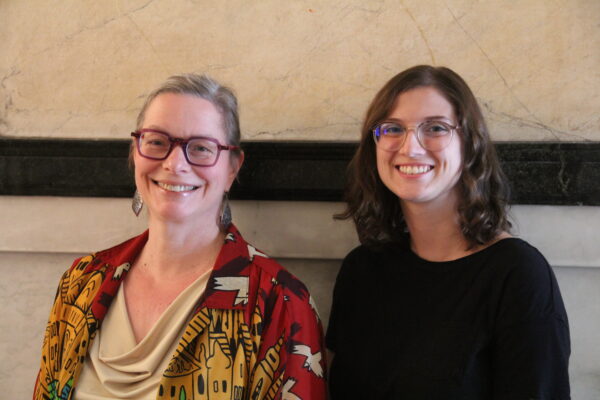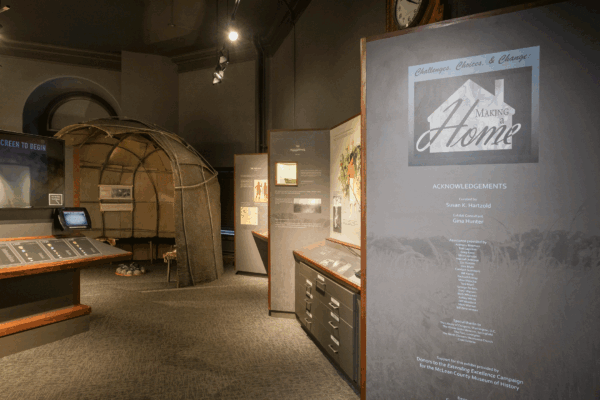The Project…
“Haciendo un Hogar en el Museo“
Location: Bloomington,Illinois
This project aims to increase the Museum’s accessibility for Spanish speakers by developing an interactive platform, including an audio tour of the building and exhibit translation.
The Organization…
The McLean County Museum of History is a nationally accredited museum dedicated to preserving, educating, and collaborating in sharing the diverse stories of the people of McLean County.
Follow @McHistoryMuseum: Website | Facebook | Instagram | YouTube | Twitter
The Q&A…
Interview with Julie Emig, executive director, McLean County Museum of History, and Emily McCusker, director of youth & family education
Q: How do you see the arts/culture/humanities as being essential?

Emily McCusker: The arts and humanities are the most meaningful way to learn about the broader world. Engaging with them fosters an understanding and appreciation of experiences outside of your own. It creates space for exploring community and self, cultivating cultural connections, and is vital to developing a better future for all.
Julie Emig: At the McLean County Museum of History, we prioritize civics education by teaching others how to navigate the often contentious terrain of today’s events. One clear example of this is our Community in Conflict exhibit (2019), which relays individual stories from the people of McLean County within the context of national and international upheaval. We can only grow by understanding what has come before, which is an essential facet of the humanities.
Q: What is the most important thing people should know about your work?
Emily McCusker: The 1903 courthouse building that houses our Museum is the central landmark in historic downtown Bloomington. We are uniquely physically located in the center of our community, and the community is at the center of all that we do. From providing meaningful experiences to those who live here today to prioritizing diverse perspectives in the stories we tell of the past, the people of McLean County are paramount to our mission.
Julie Emig: We are so much more than your average county historical society — we are among the top 3% of museums in the country. Visitors often comment on the high quality of our exhibits, educational programming, breadth of content, and research capacity. We emphasize both preservation and accessibility and want anyone from anywhere to be able to study and explore our collections.
Q: How did you arrive at doing what you do?

Emily McCusker: I’ve loved history since I was a little kid and have always wanted to work in museums, but it wasn’t until I interned at the Illinois Holocaust Museum that I knew I wanted to be a museum educator. Creating resources for students and patrons to engage with history and expand their understanding of our world began to fuel my fire. It’s vital to not only teach what happened but also why it is important and how it has shaped the world today. That’s the part of history I find the most compelling; it’s not just what happened but what we can learn from it.
Julie Emig: I’ve always been a nerd for the humanities. I began my career as a high school English teacher and then pursued a doctorate in language, literacy, and cultural studies. Through decades of work in multiple school districts, I have seen firsthand that humanities education can enormously influence what young people imagine their futures can be.
Q: Organizational partnerships, funders, individuals who support or volunteer for your organization, volunteers, etc. broadly defined, who helps move your work forward?
Emily McCusker: Our community moves our mission. Our volunteers, community collaborators, nonprofit network, members, and local businesses are all integral to the Museum’s success. The Museum’s programs, research, and day-to-day operations wouldn’t be possible without their support — especially our volunteers, whose generous gift of time and talent ensures we can continue to operate at this capacity and caliber.
Julie Emig: Those in our community also provide most of our funding. We are a small nonprofit in Central Illinois and rely on the support of our membership base and individual donors. We are 70% privately funded! Our most significant efforts are typically funded through grants, such as a lighting restoration project, the digitization of a million photo negatives, and, of course, the creation of a Spanish-language audio tour.
Suggested Reading:
- Emily McCusker: I pull a lot of inspiration from reading issues of the Post Amerikan, an underground, alternative newspaper based in Bloomington and run collectively by volunteers from 1972-2003. It was the longest, continuous underground newspaper publication in America. To explore over 250 editions available on our website, go to mchistory.org/research/post-amerikan.
- Julie Emig: I enjoy reading the American Alliance of Museum’s Magazine and any work by the late Cinnamon Catlin-Legutko.
About The Illinois Humanities Grantee Partner Spotlight
Illinois Humanities highlights the work of our Community Grants program partners through our “Grantee Spotlight.” It shines the light on our grantee partner’s work, offering details about the organization and the funded project, as well as a Q&A with a team member at the organization. More: ILHumanities.org/Spotlight
About Illinois Humanities
Illinois Humanities, the Illinois affiliate of the National Endowment for the Humanities, is a statewide nonprofit organization that activates the humanities through free public programs, grants, and educational opportunities that foster reflection, spark conversation, build community and strengthen civic engagement. We provide free, high-quality humanities experiences throughout Illinois, particularly for communities of color, individuals living on low incomes, counties and towns in rural areas, small arts and cultural organizations, and communities highly impacted by mass incarceration. Founded in 1974, Illinois Humanities is supported by state, federal, and private funds.
Learn more at ilhumanities.org and on Facebook, Twitter, Instagram, and LinkedIn @ILHumanities.
